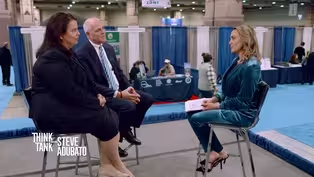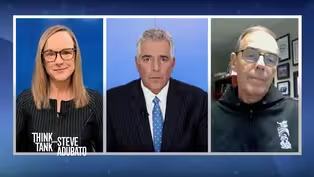
Essential Leadership Skills Needed in the Next Generation
Clip: 3/9/2024 | 8m 40sVideo has Closed Captions
Essential Leadership Skills Needed in the Next Generation
Steve Adubato and Think Tank Correspondent Mary Gamba are joined by Bryan Crable, Ph.D., Founding Dean, College of Human Development, Culture, and Media at Seton Hall University, who discusses innovation in higher education and what leadership skills are essential for this next generation.
Problems playing video? | Closed Captioning Feedback
Problems playing video? | Closed Captioning Feedback
Think Tank with Steve Adubato is a local public television program presented by NJ PBS

Essential Leadership Skills Needed in the Next Generation
Clip: 3/9/2024 | 8m 40sVideo has Closed Captions
Steve Adubato and Think Tank Correspondent Mary Gamba are joined by Bryan Crable, Ph.D., Founding Dean, College of Human Development, Culture, and Media at Seton Hall University, who discusses innovation in higher education and what leadership skills are essential for this next generation.
Problems playing video? | Closed Captioning Feedback
How to Watch Think Tank with Steve Adubato
Think Tank with Steve Adubato is available to stream on pbs.org and the free PBS App, available on iPhone, Apple TV, Android TV, Android smartphones, Amazon Fire TV, Amazon Fire Tablet, Roku, Samsung Smart TV, and Vizio.
Providing Support for PBS.org
Learn Moreabout PBS online sponsorship- We're now joined by Dr. Bryan Crable, who is the Founding Dean of the College of Human Development, Culture and Media at Seton Hall University, one of our longtime higher ed partners.
Good to see you, Bryan.
- Good to see you, Steve.
Thanks so much for having me.
- Bryan, the subject that, you have a couple of books that I want to talk about today.
- Sure.
- But the one that is coming out, "White Sacraments: Everyday Rituals of White Supremacy," the core of that book is what?
And why is it so important to be writing about it and speaking about it publicly?
- Well, what the book is trying to do is answer a question that I saw raised by a blogger, which is how is it that a culture that does so much to dehumanize and oppress Black Americans at the same time also worship and admire them?
And so I became interested in the ways in which we think about White supremacy maybe incomplete.
We think of it in terms of anger or fear, people with tiki torches, engaged in violence.
I became interested in the ways in which reverence and admiration might also be a way in which White supremacy functions.
And so what the book does is lay an argument for that approach to White supremacy, drawing on the work of Ralph Ellison, Black American novelist and critic, in order to try to identify some of these rituals as a way for us to intervene differently into White supremacy.
- And by the way, your previous book deals with Ralph Ellison in greater detail.
"Ralph Ellison and Kenneth Burke: At the Roots of the Racial Divide."
- Let's go back.
So, you said, Dr. Crable, that White supremacy is actually more sophisticated and complicated than some people think.
The tiki torch visual that everyone knows, it's disgraceful, it's disgusting, it's speaks for itself.
But you're also saying that White supremacy can embody or have those who are in fact White supremacists, right, those who fall into that category, admiring a Black athlete, a Black entertainer.
For example, play this out for us.
- Oh, for sure.
I mean, one of the things that I've seen, for instance, in traveling in Europe, are all the ways in which hip-hop is sort of spread internationally or festivals in Europe that involve a great deal of Blackface sort of people in, average White people using Blackface as part of religious ceremonies.
Three Kings Day is infamous in Spain, for example.
There are a number of Christmas characters in Scandinavian countries that involve Blackface, as well.
And so, it's not necessarily just people who would identify as White supremacists, but I became interested in how everyday White people, someone like myself, might engage in practices that reinforce White supremacy, which isn't to say that I would sort of see myself in that way, but that my actions might be inadvertently participating in something larger and so- - Do we not know, Bryan?
- Hmm?
- I'm sorry for interrupting.
Do we not know?
- I think people don't necessarily, I think White people do not necessarily recognize the implications of things that they engage in.
And so that's part of what my book is trying to highlight, right, you think about examples of White people touching Black folks hair, right?
Sort of this fascination with contact with hair in that sort of fashion, or the ways in which Black Americans might be talked about in terms of food, right?
Like talk about someone's skin as chocolate or mocha.
And so part of what my book tries to do is sort of excavate the ways in which these kind of practices are actually problematic if we think about White supremacy in a broader sense, - Lemme try this.
I've got a friend and he knows who he is.
- Okay.
- And I've seen his, and he's a close friend, but I believe his views on race and racial equity and equality, they don't match up with mine.
And for me, they're problematic.
But he'll often talk about his admiration for Michael Jordan.
- Right.
- The late Michael Jackson.
- Right.
- And somehow imply that because he likes them and admires them, are fans of theirs, "We're all good."
And I won't debate him on it, but it doesn't add up to me.
Am I in the wrong ball field here?
- No, you're exactly in the right place.
And I think the comedian, Hannibal Buress, has a joke where he talks about on Saturdays, a lot of White viewers say, "That man runs so fast, I'm not even so racist anymore," right, like sort of that idea that you can- - Talking about sports?
- Talking about sports, right.
Like sort of admire or revere someone for certain qualities and then that makes you not someone who has problematic attitudes, but, "No, look, I appreciate, I revere them.
This person is my hero."
And part of what I'm trying to do in the book is sort of get at the ways in which, as you pointed out, Steve, those things aren't necessarily mutually exclusive, right?
Engaging in those kind of behaviors doesn't necessarily take you outside of White supremacy.
It may be contributing to it inadvertently in a different kind of way.
- Bryan let me ask you this 'cause I'm also fascinated by our inability and or unwillingness in society to talk candidly, honestly about race, about race relations, about our own racial prejudice bias.
And I love people who say, they have none.
None!
No bias!
It doesn't exist in them!
Okay.
That being said, to what degree was it, is it problematic for you, as a scholar who happens to be White, writing about race in such a candid way?
And do you believe there are some folks who believe that this should not be something you're getting into because you're White and because you don't understand Black culture?
- For sure.
And I definitely try to play a very particular role and be very mindful of my position in this.
And so my book is about Whiteness.
It's about the ways in which White people and White communities engage with Blackness and Black identity.
So I'm not speaking about the Black experience because as you said, Steve, obviously, I know nothing about that.
But what I do have is expertise in what it means to be White and the way that White people think and talk to one another.
And so I draw on that.
- Bryan, hold on.
And again, sorry for interrupting again.
- Oh, no problem.
- Is the objective on some level to have us, those of us who are White, frankly feel guilty about- - Oh, no, no.
- Ourselves?
Then help us understand.
- Sure.
- 'Cause there are people watching right now who are thinking, "Okay, well what am I supposed to do with that?
Am I supposed to feel worse about myself?"
Please.
- No, no, no.
Yeah, no, it's not about a sense of individual guilt.
But I think it is a recognition of the ways in which we might be engaging in practices that are problematic, things that we don't necessarily think about.
And one of the things that's been challenging for me is thinking through my own implication in the things that I'm talking about.
That doesn't make me guilty.
That doesn't make me a terrible person.
But it means that if I want to understand and actually contribute to a more just world, then I should pay attention to what it is that I'm doing and I should think about it in a different way.
But that's not about individual guilt.
It's instead about recognizing how this is a system and a culture with a very long history.
And if I continue to participate in that without thinking, well, that's me reinforcing the problem.
And so I have another option, which is to recognize what's happening and choose not to participate.
And I saw a woman on TikTok say about her husband, a Black woman saying about her husband on TikTok, I thought it was really funny.
She said, "My husband's White, but he's not practicing."
(Bryan chuckles) (Steven laughs) And to me, I think that's the challenge, right?
How is it that one can be White but not practicing?
And that I think is one of the messages I want to take away with the book.
- The book is "White Sacraments: Everyday Rituals of White Supremacy."
The author, Dr. Bryan Crable.
The book is coming out soon.
The Founding Dean of the College of Human Development, Culture and Media at Seton Hall University, one of our higher ed partners.
Dr. Crable, thanks so much for joining us.
- Oh, thank you, Steve.
I appreciate the conversation.
- You got it.
We'll be right back.
- [Narrator] Think Tank with Steve Adubato has been a production of the Caucus Educational Corporation.
Celebrating 30 years in public broadcasting.
Funding has been provided by Horizon Blue Cross Blue Shield of New Jersey.
The North Ward Center.
The Healthcare Foundation of New Jersey.
RWJBarnabas Health.
Let’s be healthy together.
NJ Best, New Jersey’s five-two-nine college savings plan.
PNC Foundation.
PSEG Foundation.
New Jersey Sharing Network.
And by the Russell Berrie Foundation.
Promotional support provided by NJ.Com.
And by The New Jersey Business & Industry Association.
- Hello, I’m Donald Payne, Jr.
Congressman for New Jersey’s 10th District.
One organ and tissue donor can save as many as eight lives, and improve the health of another additional 75 people.
That is why I encourage everyone to register as an organ donor.
For more information about organ donation, please visit www.NJSharingNetwork.org
Implementing Diversity, Equity, & Inclusion in NJ Classrooms
Video has Closed Captions
Clip: 3/9/2024 | 10m 30s | Implementing Diversity, Equity, & Inclusion in NJ Classrooms (10m 30s)
Rev Edwin Leahy Talks Resilience Building at St. Benedict’s
Video has Closed Captions
Clip: 3/9/2024 | 9m 41s | Rev Edwin Leahy Talks Resilience Building at St. Benedict’s (9m 41s)
Providing Support for PBS.org
Learn Moreabout PBS online sponsorship
- News and Public Affairs

Top journalists deliver compelling original analysis of the hour's headlines.

- News and Public Affairs

FRONTLINE is investigative journalism that questions, explains and changes our world.












Support for PBS provided by:
Think Tank with Steve Adubato is a local public television program presented by NJ PBS

